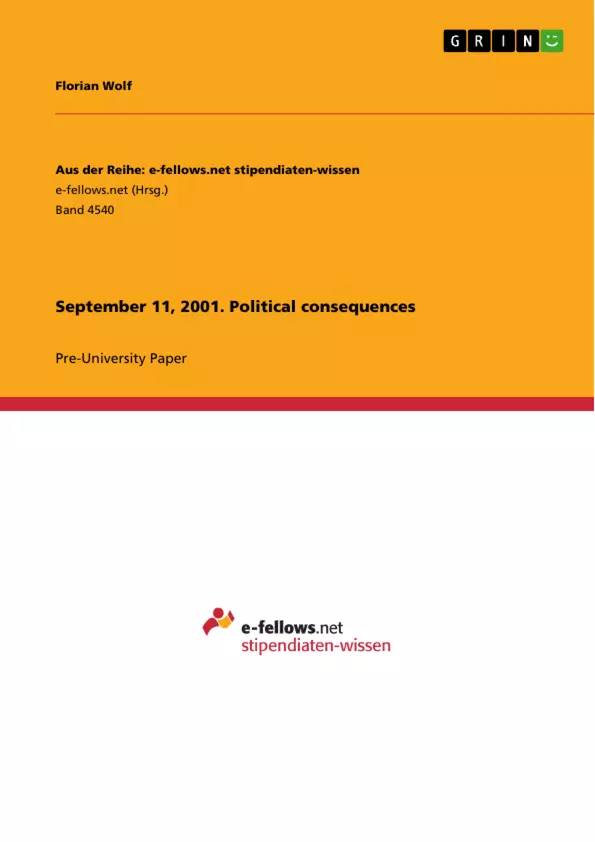The scholastic research paper firstly describes the events that led to the 11th of September. This includes the radicalisation in the Arabic states and the upgrowth of Al-Qaida. Subsequently, the author reports on the attacks themselves and their impact concerning the following domestic and foreign policy of America. This includes laws such as the US PATRIOT ACT or the monitoring by the NSA. Furthermore, Obama’s policy and the changes introduced by him are discussed and finally some conspiracy theories are shown.
Die schulische Ausarbeitung, welche mit der Note 1,0 bewertet wurde, beschreibt anfangs den Weg zum 11. September 2001. Dazu gehören die Radikalisierung in den arabischen Staaten und der Aufstieg von Al-Qaida. Anschließend berichtet der Autor über die Angriffe selbst, bevor die Auswirkungen auf die Innen- und Außenpolitik Amerikas thematisiert werden. Dazu gehören Gesetze wie der PATRIOT ACT oder die Überwachung durch die NSA. Des Weiteren wird über die Politik und die Veränderungen Obamas berichtet. Schlussendlich geht der Autor noch kurz auf verschiedene Verschwörungstheorien ein.
Inhaltsverzeichnis (Table of Contents)
- General information
- Founding and development of al-Qaeda
- Ideology and aims
- Planning of the attacks
- The Attack
- Short overview about the events
- First reactions of several institutions
- Political consequences
- New laws - USA Patriot Act
- Monitoring by the NSA
- Iraq war
- Current political situation
- Obamas changes
- Obama and the monitoring by the NSA
- September 11, 2001 – an inside job?
- Resources
Zielsetzung und Themenschwerpunkte (Objectives and Key Themes)
This text explores the political consequences of the September 11, 2001 attacks. It analyzes the events leading up to the attacks, including the founding and development of al-Qaeda, the organization's ideology and aims, and its planning process. The text also investigates the immediate political repercussions of the attacks, including the introduction of new laws like the USA Patriot Act, the expanded monitoring activities of the NSA, and the subsequent Iraq War.
- The rise and influence of al-Qaeda
- The motivations and ideology behind the 9/11 attacks
- The immediate political responses to the attacks
- The long-term impact of the attacks on US domestic and foreign policy
- The controversial issue of government surveillance and its consequences
Zusammenfassung der Kapitel (Chapter Summaries)
The text begins with a detailed overview of the founding and development of al-Qaeda, exploring the organization's origins, its leadership under Osama bin Laden, and its evolution from a group fighting the Soviet Union in Afghanistan to a global terrorist network.
The text then delves into the planning of the 9/11 attacks, examining the organization's motivations, the specific targets chosen, and the execution of the attacks. It also discusses the immediate reactions to the attacks from various institutions, including the government, the media, and the general public.
Finally, the text focuses on the political consequences of the attacks, examining the introduction of the USA Patriot Act, the expansion of government surveillance programs, and the subsequent war in Iraq. It also explores the debate surrounding government surveillance and its implications for civil liberties.
Schlüsselwörter (Keywords)
This text focuses on the key concepts of terrorism, political consequences, al-Qaeda, Osama bin Laden, 9/11, USA Patriot Act, NSA surveillance, Iraq War, and the relationship between security and civil liberties. The work explores these themes within the context of the historical events leading up to and following the September 11, 2001 attacks.
Frequently Asked Questions
What were the immediate political consequences of September 11, 2001?
Key consequences included the introduction of the USA PATRIOT Act, expanded NSA surveillance, and a significant shift in US foreign policy leading to the Iraq War.
What is the USA PATRIOT Act?
It is a law enacted to strengthen national security by expanding the authority of law enforcement to monitor communications and intercept terrorist activities.
Who was responsible for the 9/11 attacks?
The attacks were planned and executed by the terrorist organization al-Qaeda, led by Osama bin Laden, following a period of radicalization in Arabic states.
How did the attacks change US domestic policy?
They led to increased government surveillance, more stringent security measures at airports and borders, and a continuous debate over the balance between security and civil liberties.
What was Obama's stance on the policies introduced after 9/11?
The paper discusses Obama's policy changes and his approach to ongoing issues like NSA monitoring and the long-term impacts of the "War on Terror."
- Arbeit zitieren
- Florian Wolf (Autor:in), 2016, September 11, 2001. Political consequences, München, GRIN Verlag, https://www.grin.com/document/340929



